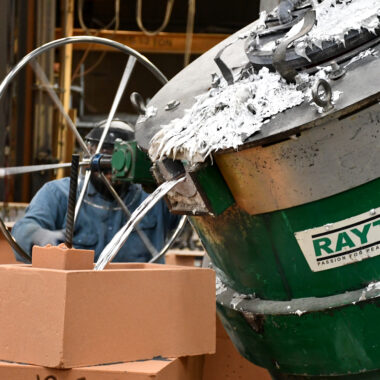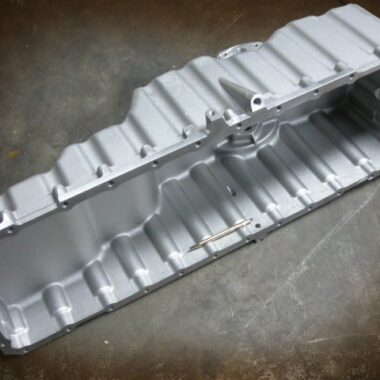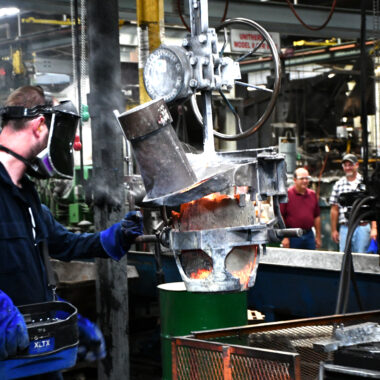About Aluminum Casting Essentials: Every Little Thing You Need to Know
Wiki Article
Crafting Excellence: Exactly How to Attain High-Quality Aluminum Castings Whenever
In the realm of light weight aluminum casting, the pursuit of excellence is a continuous trip that needs a thorough strategy and an eager understanding of the ins and outs included. Achieving consistent high-quality light weight aluminum spreadings requires a detailed grasp of the processes, from choosing the proper alloy to carrying out precise mold designs and thoroughly controlling casting specifications. Nevertheless, the real proficiency depends on the capacity to apply these elements effortlessly to develop flawless castings every single time. As we explore the details of crafting perfection in light weight aluminum spreadings, revealing the essential methods and techniques that lead to remarkable results comes to be paramount for those pursuing quality in this customized area.Comprehending Light Weight Aluminum Casting Procedures
Light weight aluminum casting processes, important in the production sector, include the complex change of molten light weight aluminum right into solid forms through a series of very carefully regulated steps. Understanding these procedures is paramount to achieving high-grade light weight aluminum castings continually - about aluminum casting. The main techniques made use of in light weight aluminum spreading are die spreading, sand casting, and financial investment spreading
Each of these procedures has its benefits and is picked based upon elements like complexity, volume, and desired surface of the light weight aluminum spreading. about aluminum casting. Comprehending the details of these techniques is critical for suppliers aiming to produce premium aluminum spreadings regularly
Selecting the Right Aluminum Alloy
Choosing the ideal aluminum alloy is a crucial decision in the production of top quality light weight aluminum castings. The option of alloy significantly impacts the residential or commercial properties and attributes of the end product. Various light weight aluminum alloys provide differing levels of strength, rust resistance, machinability, and thermal conductivity. When selecting an aluminum alloy for casting, it is necessary to consider the specific requirements of the application to ensure optimum performance.One of the most generally used light weight aluminum alloys for spreading is A356 - about aluminum casting. For applications requiring high strength, 7075 aluminum alloy is a popular choice due to its outstanding strength-to-weight ratio.
Along with mechanical residential properties, considerations such as cost, availability, and post-casting processes should additionally influence the option of the appropriate light weight aluminum alloy. By meticulously evaluating these variables, suppliers can ensure the manufacturing of high-quality light weight aluminum castings that meet the desired specs.
Executing Correct Mold Layout
Establishing a reliable mold layout is critical for guaranteeing the effective production of top quality aluminum castings. Correct mold style plays a considerable function in accomplishing the wanted attributes of the last item. To implement an effective mold layout, elements such as product flow, cooling down prices, and component geometry must be thoroughly considered.One key element of mold design is making certain proper dental filling and solidification of the aluminum within the mold tooth cavity. This involves designing runner and gating systems that promote smooth steel circulation and protect against problems such as air entrapment or insufficient filling. Furthermore, including cooling channels right into the mold and mildew design aids manage solidification rates and lower the danger of porosity or contraction problems.

Controlling Casting Parameters

Guaranteeing Post-Casting Top Quality Checks
To keep the high quality of aluminum castings, detailed post-casting high quality checks are important. After the casting process is completed, it is critical to ensure that the end products fulfill the desired specifications and requirements. One of the key top quality checks includes checking the surface finish that site of the spreadings to recognize any type of flaws such as porosity, splits, or surface abnormalities. This visual examination is usually supplemented by non-destructive screening websites methods like ultrasonic testing or color penetrant examination to discover internal problems that may endanger the honesty of the casting.Dimensional precision is another vital aspect that should be validated throughout post-casting top quality checks. Measurements of crucial measurements and tolerances should be required to confirm that the castings comply with the required requirements. In addition, mechanical residential properties such as hardness, tensile toughness, and impact resistance might require to be examined through product testing to make sure that the spreadings possess the essential strength and longevity for their designated application.
Verdict
To conclude, accomplishing premium aluminum spreadings calls for a comprehensive understanding of the spreading processes, choosing the appropriate alloy, developing molds properly, controlling casting criteria meticulously, and carrying out post-casting quality checks vigilantly. By complying with these steps, suppliers can constantly produce aluminum castings that fulfill the highest criteria of high quality and performance.Attaining consistent premium light weight aluminum spreadings requires an extensive understanding of the processes, from selecting the ideal alloy to performing exact mold designs and carefully regulating spreading criteria. The key techniques used in aluminum casting are pass away spreading, sand casting, and investment casting.
Investment casting, also recognized as accuracy spreading, involves developing wax patterns that are covered in ceramic to develop molds.Picking the suitable light weight aluminum alloy is a Continue crucial decision in the production of high-quality light weight aluminum spreadings.Making certain specific control over casting parameters is necessary for preserving uniformity and high quality in aluminum spreading production.
Report this wiki page